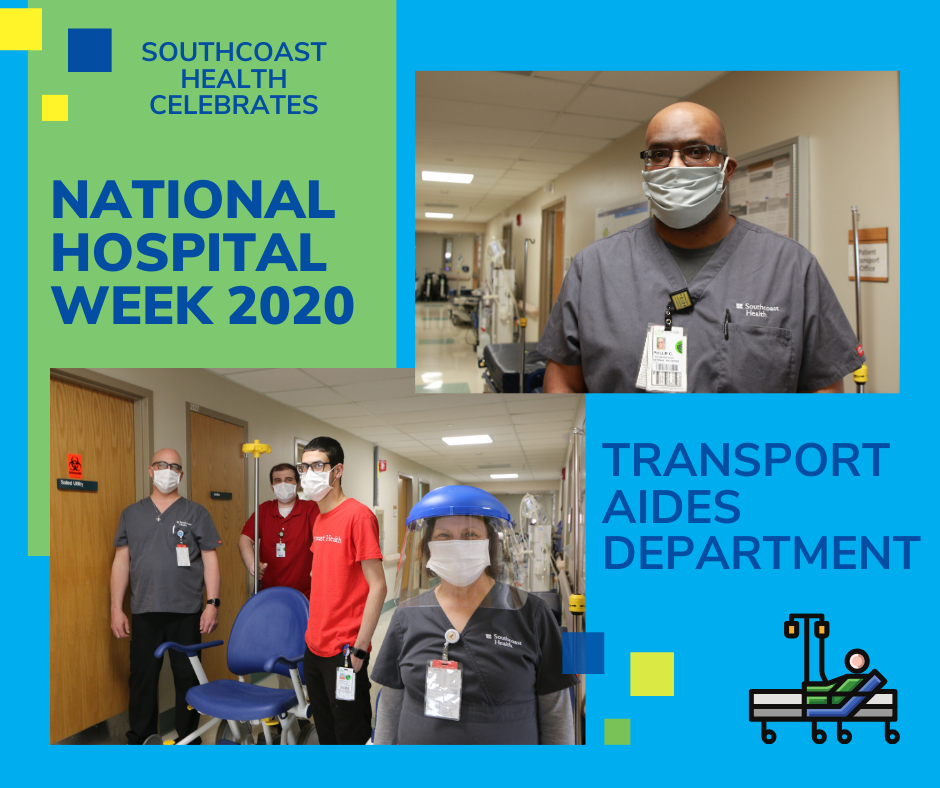Staff Profiles
National Hospital Week – Honoring Our Transport Aide Department

National Hospital Week honors the thousands of individuals and numerous departments that make health systems and hospitals a source of compassion and care in the community.
Southcoast Health celebrates each department and individual that are involved in the wellbeing of our community. At Southcoast Health, our day is never done – Hour after hour, you will find our staff committed to patient care.
From 6:30 am to 1 am every day, Transport Aides are on the move constantly at Southcoast’s hospitals – bringing patients to rooms, wheeling them to the OR, taking them for tests, and when ready for discharge, wheeling patients through the lobby to wait for vehicles upon discharge.
Southcoast has over 50 Transport Aides, getting patients to wherever they need to go. “We’re all over the hospital,” says Manny Pires, Team Lead for Central Transport at St. Luke’s. On an average day, Transport Aides “log 15,000 to 20,000 steps,” he says. That’s several miles. “I know because I do Virgin Pulse,” Pires says, recalling the days before becoming a supervisor.
The job of Transport Aide is a good fit for someone who likes not only to walk but also talk. “Our Transport staff provide a unique kind of support to patients,” says Karen L’esperance, Director, Patient Care Operations. “They strive to be upbeat and friendly. By being social and personable, they help patients feel more comfortable and less stressed. They get a lot of compliments because of their courtesy and respect for patients.”
Transport Aide Patrick Alves recollects a conversation he had with a patient who was very anxious during a trip to the OR. They began to talk. Their conversation turned to sports and their favorite teams. “We discovered we were both Patriots fans and had a nice conversation that really eased the patient’s mind,” he says.
“We try to engage patients, to be a support,” says Pires. “We talk about whatever interests them — the weather, sports, family. We ask them about their plans for when they leave the hospital.” Patients are appreciative and sometimes call back and thank the Transport Aides, he says.
Transporting patients is not an easy job, however. It’s physically demanding. It’s not just the walking that requires stamina. Pushing stretchers and beds requires strength. Additionally, COVID-19 has brought added physical challenges and new responsibilities.
“We’re helping with repositioning patients in critical care, making oxygen rounds to ensure tanks are full and taking away the empties, transporting test specimens to the lab,” says Marion McHugh, Manager of Transport/Transfer Center.
With COVID-19, by far, the most challenging requirement for Transport Aides has been the extensive use of personal protective equipment (PPE) such as gowns, masks and face shields. Putting on and taking off PPE – referred to as “donning and doffing” – takes getting used to.
“Using PPE has been a learning experience for all of us (in Transport),” says McHugh.
Pires says the staff is doing well with it, but it can get “hot and make it hard to maneuver physically.”
Nevertheless, “the Transport staff have been phenomenal. Always showing up ready to work. When things change, we adapt,” Pires says. “We enjoy helping people. We’re here to work together; to help the hospital get through this difficult time and be of service to every department that needs it.”
